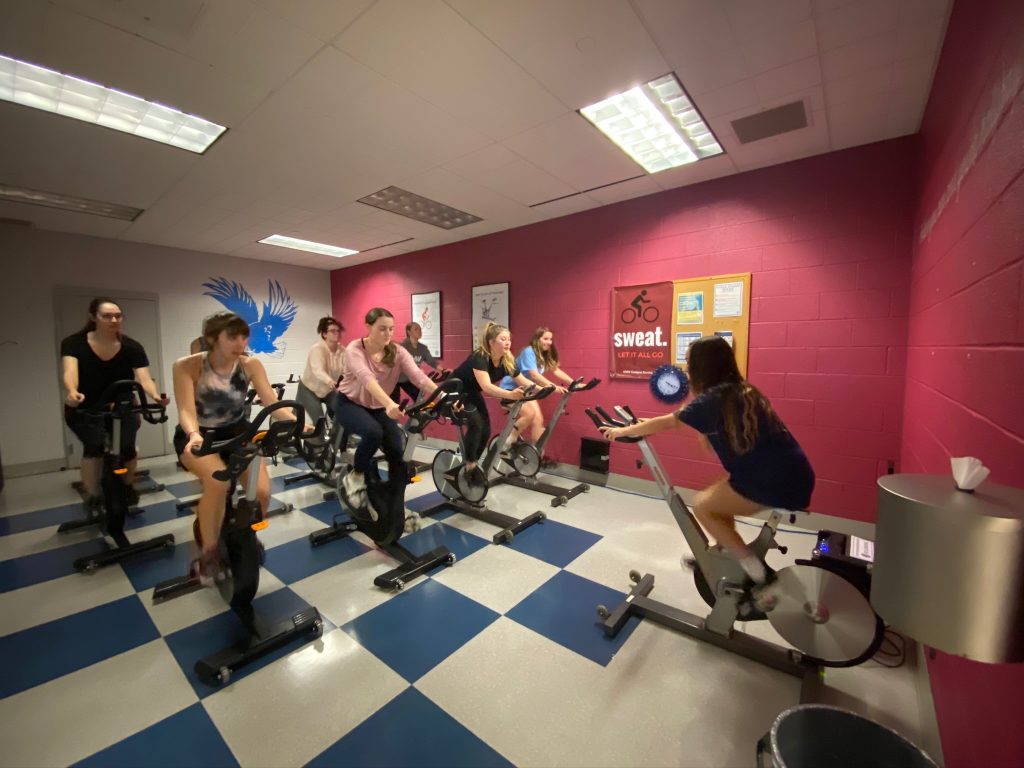Exercise resolutions benefit physical, mental, and social health
3 min read
Campus Recreation offers many fitness classes, such as cycle classes. [Brittanie Naff | Campus Recreation]
By TORI PERCHERKE
Staff Writer
A common resolution for the new year is to get back into shape. Why is going to the gym and involving yourself actively such an attractive resolution? I spoke to three Eagles who are active with Campus Rec, and they provided three different approaches to this question: Physical Health, Mental Health and Social Health.
Physical Health
Everyone knows that exercise is good for you. Moving and staying active helps control weight, and can decrease your chances of facing future illnesses. When your body is involved in physical activity such as running or lifting weights, the body delivers oxygen and nutrients to your tissues which also helps your cardiovascular system. The cardiovascular system works with your heart, blood vessels and blood to help transport nutrients, oxygen, and hormones to the cells.
Another great reason to be active is that exercise helps deepen your sleep time. Sleep is definitely important when it comes to hard working college students.
Junior Alec Charoenthep provided some advice for Eagles who might be interested in getting more fit for the new year. “Stick to a routine. It’s going to take a couple of weeks to see progress from working out. Running and rowing is great for cardio. Weight exercises, squats and dead-lifts are awesome workouts as well. Make sure after each workout, you get a good stretch in.”
Mental Health
“When you feel good physically, you feel greater mentally,” said Charoenthep.
Life can be tough, especially as a college student. Homework, projects, jobs and sports can all take up so much time, which leaves students with enormous weights on their shoulders. The Talley Center provides free therapist consultations for full-time students.
Recently, the Talley Center teamed up Campus Recreation. “The Talley Center for Counseling Services and the Student Health Center are pairing up to launch a new program this semester, the Jump Start Program- a five-week program designed to introduce students to exercise in a slower, guided manner. The program starts January 27, and we already have some students registered,” said Brittanie Naff, assistant director of Campus Recreation.
Research shows that exercise is a mood booster, and increases your endorphins. Physical activity can be a way you blow off steam after a hard day of school. Working out also lets you focus on your well-being, and helps stimulate various brain chemicals which can lead you to feeling cheery and less anxious.
Naff said, “students [should] attend some of the Campus Rec events they hear about – whether that is our free Friday Fitness Happy Hour group exercise classes, [or] our free Campus Rec Kickoff event on February 9 that will introduce all of our programs and facilities to those who may not be as familiar with it yet, or signing up to play an intramural sport. Our student staff is highly inclusive of those with varying fitness levels, skills and experience. You never know what you might fall in love with.”
Social Health
Junior Zane Burk explained how he views the gym as a place to find a common interest amongst others. Burk is the president of club basketball and often involves himself in other ways physically, like intramural sports. “You’re going somewhere where the only other people there are going to be people who have at least one other common interest with you. There are going to be other basketball players, there are going to be other people who like working out. It’s good to go somewhere where you already have a base interest.”
The gym offers free membership to every student on campus as well as a variety of other free opportunities like hiking trips, fitness happy hours and Campus Rec Kickoff.
So how does staying active benefit your social well-being? Burk justified his answer by analyzing what kind of teammate you are while playing a sport. “You’re going to learn your social concepts through a sport. If you’re a leader, that’s going to come out naturally on the field or the court. Leaders like to run situations and tell everyone where to go. You’re either a leader, or somebody who works well with being led, which is not a bad thing. That means you’re better at taking directions.”


